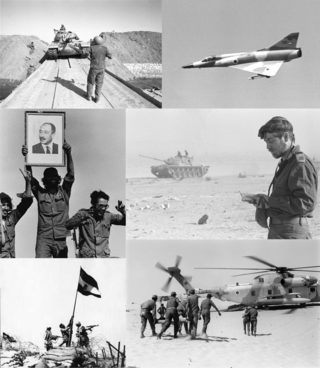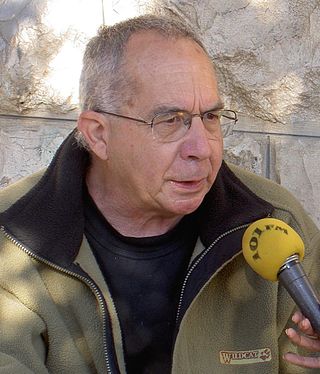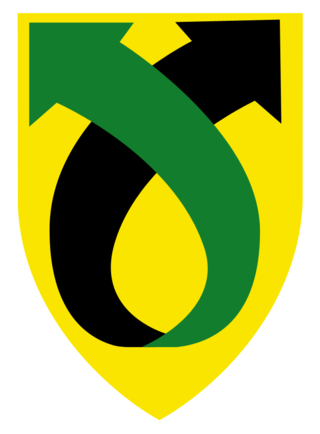
The Yom Kippur War, also known as the Ramadan War, the October War, the 1973 Arab–Israeli War, or the Fourth Arab–Israeli War, was an armed conflict fought from October 6 to 25, 1973, between Israel and a coalition of Arab states led by Egypt and Syria. The majority of combat between the two sides took place in the Sinai Peninsula and the Golan Heights—both of which were occupied by Israel in 1967—with some fighting in African Egypt and northern Israel. Egypt's initial objective in the war was to seize a foothold on the eastern bank of the Suez Canal and subsequently leverage these gains to negotiate the return of the rest of the Israeli-occupied Sinai Peninsula.
The history of the Israel Defense Forces (IDF) intertwines in its early stages with history of the Haganah.

The 35th Brigade, also known as the Paratroopers Brigade, is an infantry brigade unit of paratroopers within the Israel Defense Forces (IDF), and forms a major part of the Infantry Corps. It has a history of carrying out special forces-style missions dating back to the 1950s.

The IDF Caterpillar D9 —nicknamed Doobi — is a Caterpillar D9 armored bulldozer used by the Israel Defense Forces (IDF). The Israeli armored CAT D9 was heavily modified by the Israel Defense Forces, Israeli Military Industries and Israel Aerospace Industries to increase the survivability of the bulldozer in hostile environments and enable it to withstand heavy attacks, thus making it suitable for military combat engineering use. The IDF Caterpillar D9 is operated by the Israel Defense Forces (IDF) Combat Engineering Corps for combat engineering and counter-terrorism operations.

David "Dado" Elazar was the ninth Chief of Staff of the Israel Defense Forces (IDF), serving in that capacity from 1972 to 1974. He was forced to resign in the aftermath of the Yom Kippur War.
The Agranat Commission was a National Commission of Inquiry set up to investigate failings in the Israel Defense Forces in the prelude to the Yom Kippur War, when Israel was found unprepared for the Egyptian attack against the Bar Lev Line and a simultaneous attack by Syria in the Golan—the first phase in a war in which 2,812 Israeli soldiers were killed.

The Southern Command, often abbreviated to Padam (פד"מ), is a regional command of the Israel Defense Forces (IDF). It is responsible for the Negev, the Arava, and Eilat. It is currently headed by Aluf Eliezer Toledano.

The Israeli Armored Corps is a corps of the Israel Defense Forces that, since 1998, has been subordinate to GOC Army Headquarters. The Armored Corps is the principal maneuvering corps, and primarily bases its strength on Main Battle Tanks.
The 36th Armored Division, also known as the Ga'ash Formation ("Rage"), is the largest regular-service armored division in the Armored Corps of the Israel Defense Forces (IDF). It was subordinate to the Northern Regional Command until February 2014.

Motti Ashkenazi was a reserve captain in the Israel Defense Forces (IDF), who spearheaded a protest after the Yom Kippur War that led to the resignation of Prime Minister Golda Meir's government.
Egyptian 25th Brigade ambush was a battle that occurred on October 17, 1973, the eleventh day of the Yom Kippur War, east of the Great Bitter Lake, in the Sinai Peninsula. The ambush was conducted by the Israel Defense Forces' 162nd Division, against the 25th Brigade of the Egyptian army. The Israelis' goal was the destruction of the brigade, which attempted to disrupt the Israeli crossing of the Suez Canal.

Danny Matt was a decorated career Israeli military officer who served in the Israel Defense Forces from 1948 until 1992. He attained the rank of major general and fought in five Arab-Israeli wars, including the wars of 1948 and 1973. Among his many exploits was a daring operation involving leading a paratroop force across the Suez Canal during the Yom Kippur War. The operation was the beginning phase of a larger Israeli counter offensive that ultimately led to the victory of the Israeli army.

The Israel Defense Forces 146th Armor Division, also known as the Ha-Mapatz Formation ("Bang"), is a reserve-service armored infantry division in the IDF. It is subordinate to the Northern Regional Command.

This article deals with the history and development of tanks of the Israeli Army, from their first use after World War II in the establishment of the State of Israel after the end of the British Mandate, and into the Cold War and what today is considered the modern era.

Amnon Reshef is a retired IDF major general who served as 14th Brigade Commander in the Yom Kippur War and as Commanding General of the Armored Corps from 1979 to 1982. In 2014 he founded Commanders for Israel's Security (CIS) which he leads.

Operation Abirey-Halev or Operation Abirey-Lev also known as Operation Stouthearted Men and Operation Valiant, code-named Operation Gazelle, was an Israeli operation that took place in the center of the Suez Canal on 15–23 October 1973 during the Yom Kippur War.

55th Paratroopers Brigade, also known as "Tip of The Spear Brigade", is a reserve-service infantry Brigade in the Israeli Defense Forces.

The 340th "Idan" Armoured Division is an Israel Defense Forces reserve division. It falls under the jurisdiction of the Central Regional Command and is located in Camp Nachshonim. As of March 2016, it is commanded by Brigadier-general Avi Gil.

The 252nd Sinai Division is an Israel Defense Forces division under the Southern Regional Command. Formed in 1968, it was the first permanent division in the IDF. As of July 2016, it is commanded by Brigadier General Saar Tzur.

The Bashan Salient was a territory in Southwestern Syria which was conquered by the Israeli Army during the 1973 Yom Kippur War. The salient was about twenty kilometres wide and encompassed an area of approximately 400km2, extending to a point 33 kilometres from the Syrian capital of Damascus. The Salient was evacuated by the Israeli army shortly after the signing of a disengagement agreement between the Israeli and Syrian forces on May 31, 1974. The Salient included the summit of Mount Hermon, the town of Beit Jinn, and many other Syrian villages.















